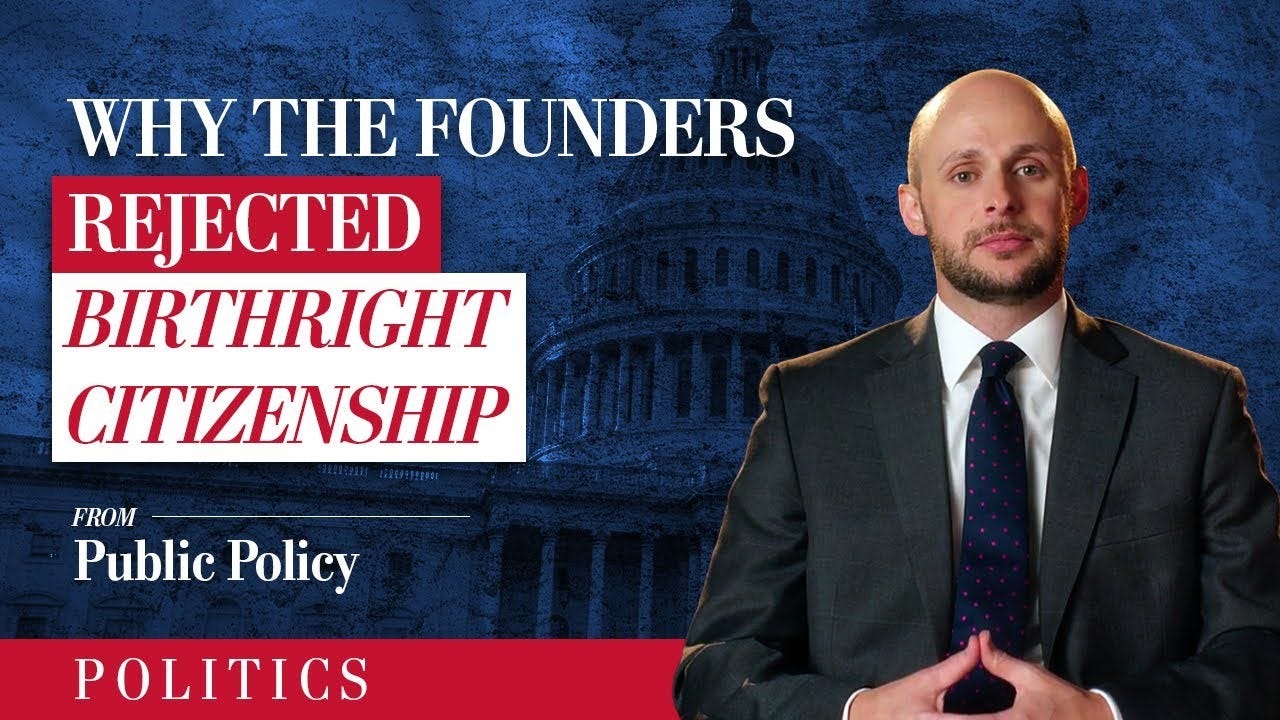President Trump is being castigated for demanding a change in our understand of birthright citizenship. But according to constitutional experts at Hillsdale College, he’s right. Birthright citizenship was never supposed to apply to people in our country illegally.
A Little History
Bear with me – this is fascinating. As American law sprung from British common law, changes were made to allow for the kind of constitutional, representative republic our founders envisioned. Citizenship wasn’t part of British common law; instead, their concept comes from feudal law, speaking to the roles of master and servant, where people have protection from the king in exchange for a perpetual vow of allegiance to him.
The Founders rejected this relationship and the idea of perpetual allegiance to a person. James Wilson, signer of the Declaration, said, “Under the Constitution of the United States, there are citizens, but no subjects.” Citizenship is based on the consent of the governed, not an accident of birth.
The Constitution of 1787 mentioned citizens, but did not define them. In 1868, the definition came in the Fourteenth Amendment, “All persons born or naturalized in the United States and subject to the jurisdiction thereof, are citizens of the United States and of the State wherein they reside.” The words, “subject to the jurisdiction” is as critical to the meaning as the second part of the Second Amendment, which is usually ignored. These words were placed there for a reason. Senator Jacob Howard, OH, who wrote this clause was clear that this language was not intended to make Indians citizens. They owed allegiance to their tribes, not the US government. The words mean “not owing allegiance to anybody else and being subject to the complete jurisdiction of the United States. And not just to American laws or courts. It means owing exclusive political allegiance to the US. (By the way, the status of Indians was resolved in 1923 on a tribe-by-tribe basis, but it was an offer anyone could reject.)
As of 1868, we also allow people to renounce their citizenship (Expatriation Act), which someone in England could not do under feudal law.
The Result
This amendment was a rejection of the feudal concept of birthright citizenship. The boon of citizenship with all its benefits and rewards cannot devolve onto children of illegal aliens. There is no right inherent in our Constitution. In fact, there is no SCOTUS decision on this subject. When we grant citizenship to the children of legal aliens, we have permitted their parents to live here. That’s a far cry from being illegal aliens. Our Legislature could decide that illegal aliens’ children are subject to our jurisdiction, but they haven’t done so.
Permanent residents have responsibilities they sign up for:
Required to obey all laws of the United States and localities;
Required to file your income tax returns and report your income to the U.S. Internal Revenue Service and state taxing authorities;
Expected to support the democratic form of government (“support” does not include voting. Permanent residents cannot vote in federal, state, or local elections.); and
Required to register with the Selective Service, if you are a male age 18 through 25.
Dual Citizenship
The same mistake as giving birthright citizenship to illegals was repeated with permitting dual citizenship. You must owe exclusive allegiance to the US; thus, dual citizenship doesn’t make any sense. For those who took the oath, you are required to make a pledge of such allegiance. There is political pressure around the world to tolerate the idea of a “citizen of the world, but it is more because of elite liberal opinions that this is happening. Most of them do not like the idea of a nation-state with legitimate borders. The idea is that of “human rights.” However, with the desirability of living in the US as a citizen, we have the right to decide who qualifies for citizenship. It isn’t a human right. If it were, we would have half the world in our country. It’s also a responsibility.
Mexico is hot on pushing for the birthright citizenship, but the country itself is dependent on the remittances of Mexican citizens living here to have any economy at all.
The Nation-State
Constitutional democracy can only exist in a nation-state. The EU is NOT a nation-state, and for that reason, it is moving towards administrative tyranny. Brexit was a result of rejection of the totalitarian rule of unelected bureaucrats in Belgium. And countries are fighting back against illegal immigration despite the laws in the EU.
Our nation-state will only survive as the most vital and attractive country as long as we demand exclusive allegiance to a “separate and equal nation.” I would suggest that the lack of assimilation and appreciation for our country’s values show that too many coming here have no allegiance to the US. In fact, given that Islam is in many ways more a government disguised in a religion than a religion, and that practitioners want to have their own courts supersede US law, perhaps Muslims are not practicing exclusive allegiance. Just a thought.
We need to get back to our fundamentals or we will become more of a feudal society, like the EU, where there are only subjects, but no citizens.




